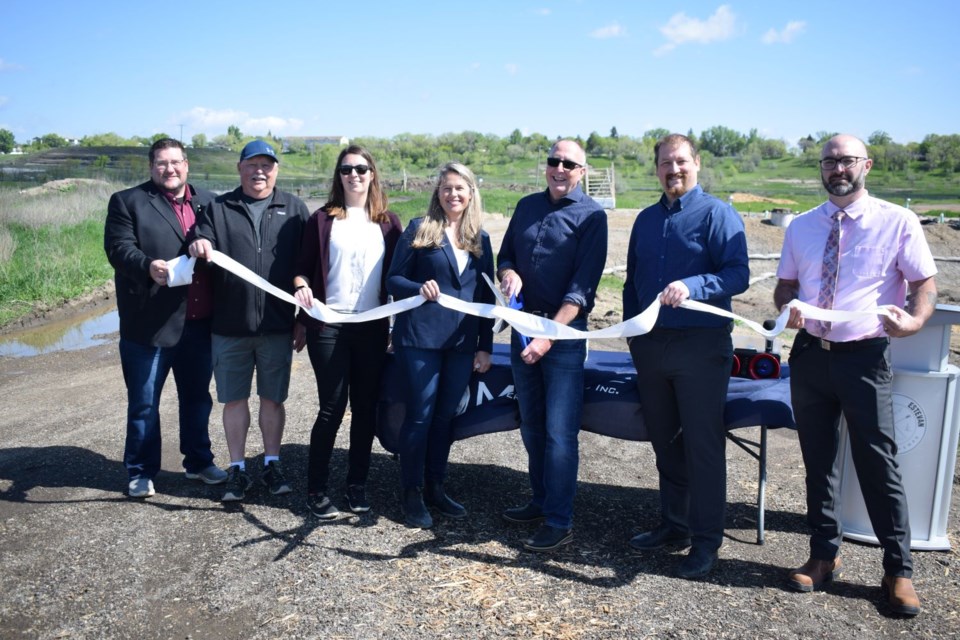ESTEVAN — A one-year pilot project that is looking to prove wastewater treatment technology is underway in Estevan.
A brief ceremony was held near the city's wastewater treatment plant Monday with representatives of the City of Estevan and Magna Engineering Services in attendance. Compared to a submersed wetland, it takes a lot of the features that wetlands offer for the environment and makes them year-round.
Shane Bucsis, the manager of the city's water and wastewater treatment plants, said the project was completed a couple of weeks ago. The effluent has been running for a couple of weeks and a raw sewage component has been operating for a week.
"It's been operating as expected," said Bucsis. "It takes a while for the bugs to grow in the cells, and for the proper bacteria to take hold."
This is the first project of its kind in Saskatchewan.
The City of Estevan revealed last year it was looking at options for its wastewater treatment plant due to the uncertain future for the Shand Power Station. SaskPower currently takes all of the plant's effluent as boiler-feed water after going through the wetlands. Through this agreement, which has been in place since 1996, the city doesn't release any effluent into the environment.
However current federal regulations call for conventional coal-fired power stations like Shand to come offline in 2030.
If Shand were to shut down, the city wants to be ready with a process to release into the Souris River while meeting stringent environmental standards, while having an option that is as affordable as possible.
Bucsis presented six options to the city last year. The one now underway in Estevan is regarded as the best. Project is getting attention from elsewhere
"Right now, the only solution is a mechanical treatment plant, which would run around $60 million. With piloting this project, it gives us the option to look at a solution that would cost around $12 [million] to $30 million, depending on which way we go," said Bucsis.
The pilot project has a $550,000 price tag, which is being cost-shared by SaskPower and a Federation of Canadian Municipalities grant that covers construction, engineering, lab tests and operating costs.
"The electrical cost is almost minimal for the operation of the plant," said Bucsis.
Trees and grass will be planted around the site, taking away the smell and the appearance of a typical wastewater plant.
Jennifer Massil, the CEO with Magna Engineering, was at Monday's launch, along with project manager Jordan Quick. Massil said this project is about what to do with water once people are finished with it.
"This project is a great example of creative engineering and problem solving to take on the challenge of wastewater treatment, and turn it into an opportunity, by addressing both the community and the environment," said Massil.
The project in Estevan is a win for the environment, she said.
"We're looking at a bioengineered landscape, harnessing the power of micro-organisms, specialized media and vegetation to naturally purify wastewater. Working with nature allows us to address the objectives of wastewater treatment in a resilient, environmentally friendly way," she said.
The biggest asset with the Magna Biofilter Wetland System is biodiversity of micro-organisms, she said. A lot of the biological work is similar across all biological treatment, but in this instance, they're doing it in a passive way, with low operation and maintenance.
When people think about wetland systems, they think of cattails and ducks, but she said this system is different.
"That's when we talk about the importance of wetlands across Canada for drinking water. What it is, is it's not the plants that are uptaking it, it's a lot of that … media material in the bottom of the wetlands."
Mayor Roy Ludwig said this project would be much more effective than a mechanical system while enhancing the environment.
Project is getting attention from elsewhere
Bucsis said this project is not only a solution for Estevan, but it could be viable for towns, villages and rural municipalities in the province. Engineering firms have reached out to the city to see how it's running and what the timelines are.
"It is completely sizable, and can provide solutions to a lot of smaller communities that don't have the funding to handle a large mechanical process," said Bucsis.
As wastewater regulations have tightened over the years, a lot of municipalities are facing issues with how to treat wastewater in a proper way. It might be $12 million for this option or $60 million for a larger mechanical plant to work in Estevan, while a smaller community might face $7 million for a mechanical plant and a $1 million or $1.5 million price tag for this concept.
While this process is new to Saskatchewan, it has been used elsewhere, including Alberta and B.C. Massil invited council members to check out one of Magna's facilities in Alberta while council members attend next week's convention of the Federation of Canadian Municipalities in Calgary.
Once the pilot project is complete, and if the province gives it the green light, then the project will move into the detailed design phase. Estevan city council would have to give its blessing, too.




